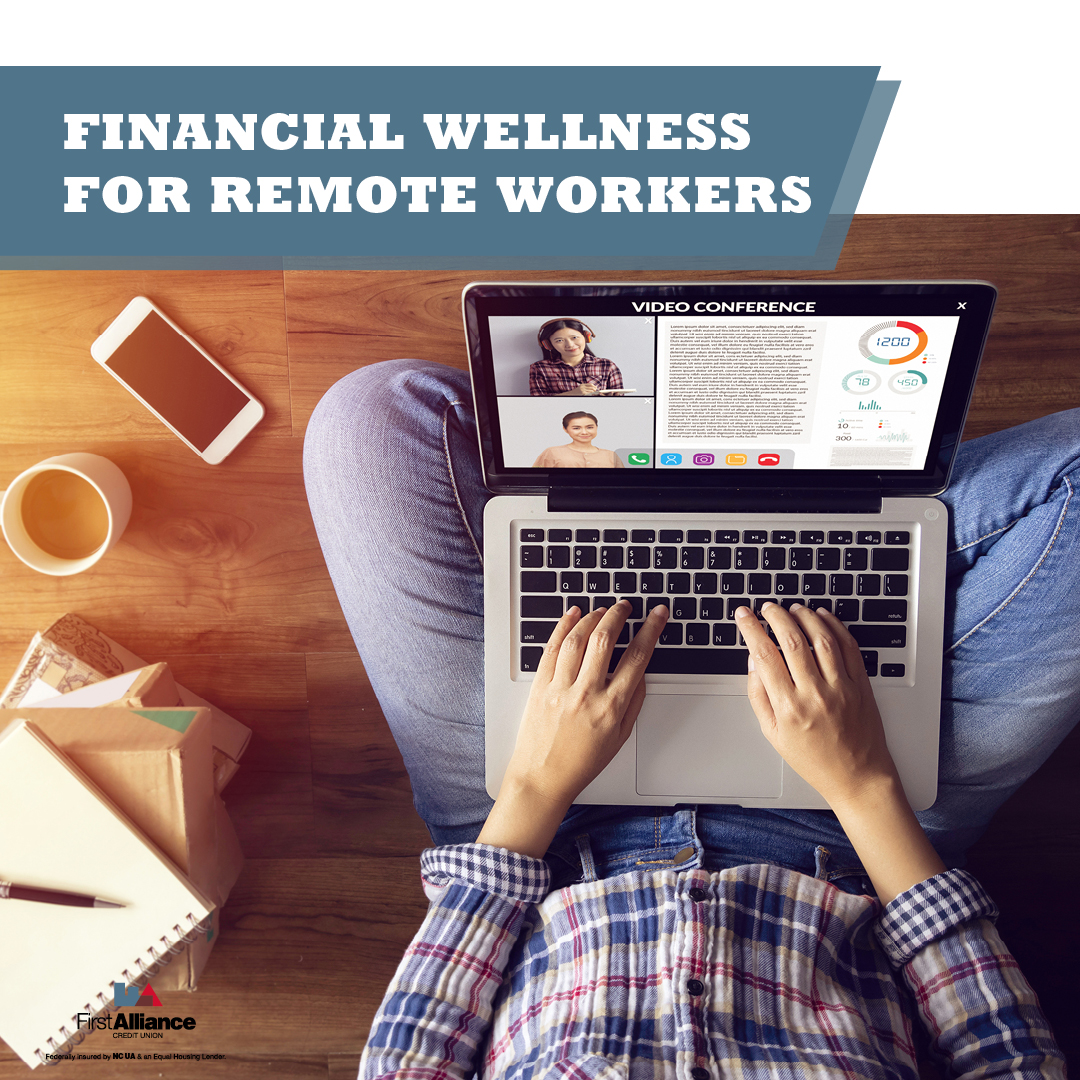Financial Wellness for Kids
Practical money management skills learned at an early age can have a lasting impact on the rest of your child’s life. In fact, this is one of the...
8 min read
![]() First Alliance Credit Union
:
Sep 29, 2023 4:45:00 AM
First Alliance Credit Union
:
Sep 29, 2023 4:45:00 AM

As more individuals embrace the remote work lifestyle, the need to address their financial well-being becomes increasingly vital. According to a striking statistic, 56% of financially stressed employees spend three hours or more each week dealing with or thinking about their personal finances while on the job. That's three hours of lost productivity and engagement that could be channeled toward achieving professional success and personal fulfillment.
This blog post will discuss the hurdles you might face and share some strategies to help you find financial stability and make solid plans for your future. Whether you're a seasoned remote worker or just starting on this journey, you can take advantage of the following tools and insights to pave the way to a financially secure and fulfilling remote work experience.

Financial wellness is about how smartly you handle your dough and make cash decisions that enhance your overall well-being. It isn't just about sitting on a pile of gold. It's all about the inner calm and security you feel about your personal finances.
To be financially sound, you must have your finances on a leash, believe in your ability to juggle surprise bills and have a roadmap for future money milestones. It's a delicate dance between enjoying the now and gearing up for the later.
If you work remotely, ensuring financial wellness at work takes on another level of importance. Addressing financial concerns helps employees thrive professionally and fosters a healthier work culture where individuals can focus on their tasks without the constant distraction of financial stress.
The first step to shoring up your financial wellness is to understand what constitutes financial wellness in the first place.
Financial security is the foundation of financial wellness. It's about having enough savings and resources to cover your basic needs and handle emergencies without worrying about money. This might include:
True financial wellness means having the freedom to make choices that align with your values and goals. It's about not being limited by financial constraints regarding life decisions. When you have freedom of choice you can decide to, among other things, pursue your passions, travel, and invest in personal growth, among other things.
For remote workers, utilizing effective remote work tools for job opportunities and managing work-related tasks is crucial. These tools not only streamline the job search process but also contribute to the overall financial stability of remote workers, helping them achieve their financial goals while enjoying a flexible work environment.
While preparing for the future is essential, financial wellness also involves enjoying the present without having to constantly stress about money. It's about budgeting wisely, understanding your spending habits and balancing between saving for tomorrow and enjoying life today.
Financial well-being requires looking ahead and planning for long-term goals. This includes saving for retirement, investing wisely, and being proactive about your financial future. By setting clear objectives and creating a roadmap to achieve them, you can build a sense of financial security and confidence.
Remote work comes with its fair share of challenges, from grappling with a lack of financial structure to coping with isolation and limited support. Here are some various financial challenges remote workers usually face.
The biggest hurdle remote workers face is the need for more financial structure. Unlike traditional office settings, where and fixed expenses are the norm, remote workers often encounter a more unpredictable financial landscape. The more financial structure you have in your life, the more manageable your finances become.
Isolation and limited support emerge as prominent challenges for remote workers. In contrast to the vibrant social connections often experienced in traditional office environments, remote work can often lead to feelings of detachment. The absence of face-to-face interactions with colleagues and supervisors can leave remote workers yearning for the sense of belonging and collaboration that physical workplaces offer. This can prove especially challenging with finances, where remote workers might not have the ability to get outside help if they have financial questions.
Income inconsistency poses a significant concern for many remote workers. Unlike traditional jobs with stable salaries, remote work may entail project-based contracts or freelance gigs, leading to fluctuations in earnings from month to month. The uncertainty of income can create financial stress and make budgeting more challenging.
To address this challenge, remote workers can explore diverse income streams, such as part-time gigs or freelance opportunities. Platforms like Adzuna, Upwork and Fiverr offer a wide range of job listings, allowing remote workers to find suitable opportunities and stabilize their income.
While potential income inconsistency can be unsettling, embracing the flexibility of remote work allows individuals to adapt and seek out various opportunities that align with their skills and interests.
As remote work becomes more prevalent, so does the increased responsibility for personal finance faced by remote workers. In a traditional office setup, certain financial aspects, like taxes and benefits, are typically managed by employers. However, remote workers must now navigate these complexities independently.
Understanding tax implications, budgeting effectively and planning for retirement all fall under the purview of remote workers. This newfound responsibility demands a higher level of financial literacy and discipline. While it may seem daunting initially, taking charge of personal finance can also offer a sense of empowerment and control over one's financial future.
Remote workers must stay informed about tax regulations that may vary depending on their location and the nature of their work. Keeping track of deductible expenses and maintaining organized financial records becomes crucial to ensure a smooth tax filing process.
We must explore practical strategies for the discussed challenges to establish a robust financial framework that promotes stability, security, and peace of mind. Discovering the path to financial wellness involves implementing effective strategies to attain stability and security.
From budgeting and expense tracking to building an emergency fund and retirement planning. These approaches for managing debt and credit while seeking professional financial advice to achieve lasting financial well-being.
Adapting to a home-based work lifestyle also means revisiting your daily spending habits. Let’s explore how you can reshape your budget to fit into your new work-from-home routine:
Working from home is synonymous with saying goodbye to the daily commute. This can save a big chunk of your budget, previously spent on fuel or public transportation fares. You can redirect these savings to other necessary areas of your budget or even start nurturing a healthy savings fund.
Since remote workers spend more time indoors, it’s natural to witness a rise in home utility bills. It’s a good idea to allocate a slightly more significant amount to cover the expenses of utilities like electricity and internet to avoid any surprises at the end of the month.
Staying home also means eating more often. While this saves you from spending on lunch outings, your grocery bill might increase. Get to enjoy cooking at home and avoid overspending at the grocery store by planning your meals.
Staying close to your computer most of the time could tempt you into online shopping sprees. Make a concerted effort to steer clear of unnecessary purchases. Set aside a small allowance for occasional indulgences to keep your urge for impulse buying in check.
The cornerstone of any financial wellness is a budget. Here are some popular budgeting methods to choose from:
This method requires setting aside specific amounts for different spending categories like housing, groceries, utilities, and entertainment. It's a systematic way to allocate your income and keep your spending in check.
A more meticulous traditional budget approach where every dollar you earn is assigned to various expenses or savings. The goal here is to ensure that your income minus your expenses equals zero. This approach fosters a disciplined spending habit and ensures that no dollar goes to waste.
An easy-to-follow strategy, this method divides your income into three segments: 50% for essentials (needs), 30% for personal choices (wants), and 20% reserved for savings and debt repayment. It encourages balanced spending and savings habits.
Tracking your expenses effectively is a critical step in sticking to your budget. Here are various ways you can go about it:
Sometimes, the old-fashioned way is the most effective. Keeping a notebook or a planner to jot down all your expenses can help you stay organized.
Leverage the power of spreadsheet software to create a comprehensive log of your expenses. It's a more digital and detailed approach to monitoring your financial transactions.
In today's tech-savvy era, mobile apps have become a popular tool for financial management. You can access many apps that help you conveniently track your financial transactions.
Your mobile app's First Alliance My Money feature is an excellent tool. It provides an easy platform to track your expenses and integrates with your banking details, giving you a seamless experience managing your finances, even when you're moving.

Another stone in the financial wellness foundation is growing your emergency fund. This is where remote workers can really take advantage of their situation. If you’re starting to put together an emergency fund, here are two tips that can help you out.
One of the immediate benefits of working from home is that you don't have to spend much on formal clothing or daily lunches at expensive eateries. You can use the cash you save to beef up your emergency fund.
When working remotely, you often have extra time. Why not use this time to earn some extra money? You can look for freelance or part-time roles matching your skill set. This way, you utilize your time efficiently and swiftly add a nice chunk to your emergency fund.
Remember, small, consistent steps can lead to a substantial emergency fund over time. Start today and watch your savings grow, fostering a sense of financial security and peace of mind in your remote working lifestyle.
Remote workers can carve out personalized strategies for retirement planning that aligns with their unique work setup. Here's some helpful tips:
Remote workers aren't spending money on daily commutes or formal work attire, so they have more financial wiggle room. These savings can be channeled straight into a retirement fund. It's a subtle change, but these savings can accumulate over time into a substantial nest egg for your golden years.
Remote workers often have a better grasp of technology and online tools. They can use this knowledge to explore varied investment avenues for building a robust retirement portfolio. The virtual work culture allows for a more tech-savvy investment approach, from investing in stocks to exploring cryptocurrencies.
Remote workers can consult online with financial advisors to build a structured and strategic retirement plan. This way, they can make informed decisions that align with their long-term retirement goals.
Debt management involves effectively handling the debts you owe, such as credit card balances, student loans and mortgages. On the other hand, credit management pertains to maintaining a positive credit history and using credit responsibly.
Debt can quickly become overwhelming and lead to financial stress if left unchecked. Proper debt management helps you avoid falling into a cycle of debt and ensures that you can meet your financial obligations without undue burden. Additionally, managing credit responsibly helps you maintain a good credit score, which is essential for securing loans and favorable interest rates in the future.
Taking care of your financial health is like embarking on a lifelong adventure. It's about handling your money carefully, always keeping your present needs and plans in mind and discovering that sweet spot between enjoying the here-and-now and gearing up for what's to come. Ultimately, it means feeling calm and secure when dealing with money matters and freeing yourself to chase after your dreams and ambitions.
Remote workers encounter unique hurdles, such as the lack of financial structure and isolation, which can impact their productivity and well-being. To counter these challenges, we’ve discussed essential strategies for financial wellness. Remote workers can pave the way to financial security and peace of mind by implementing these strategies and embracing the journey toward financial wellness.
Empowered with knowledge and discipline, they can thrive financially, enhancing their professional and personal lives. Remember, financial wellness is an ongoing journey, and with determination and proactive measures, remote workers can unlock a brighter and more fulfilling future.
This guest post was written by Ajay Paghdal, a recognized digital marketing entrepreneur who is no stranger to remote work. He is the founder of several businesses, including Pitch Panda and Linkio.

Practical money management skills learned at an early age can have a lasting impact on the rest of your child’s life. In fact, this is one of the...

With Valentine's Day right around the corner, love is in the air! It's a time when people celebrate the special relationships in their lives by...

One of the most important and fundamental habits for financial wellness is budgeting. By making budgeting a habit now, you will see lots of benefits...